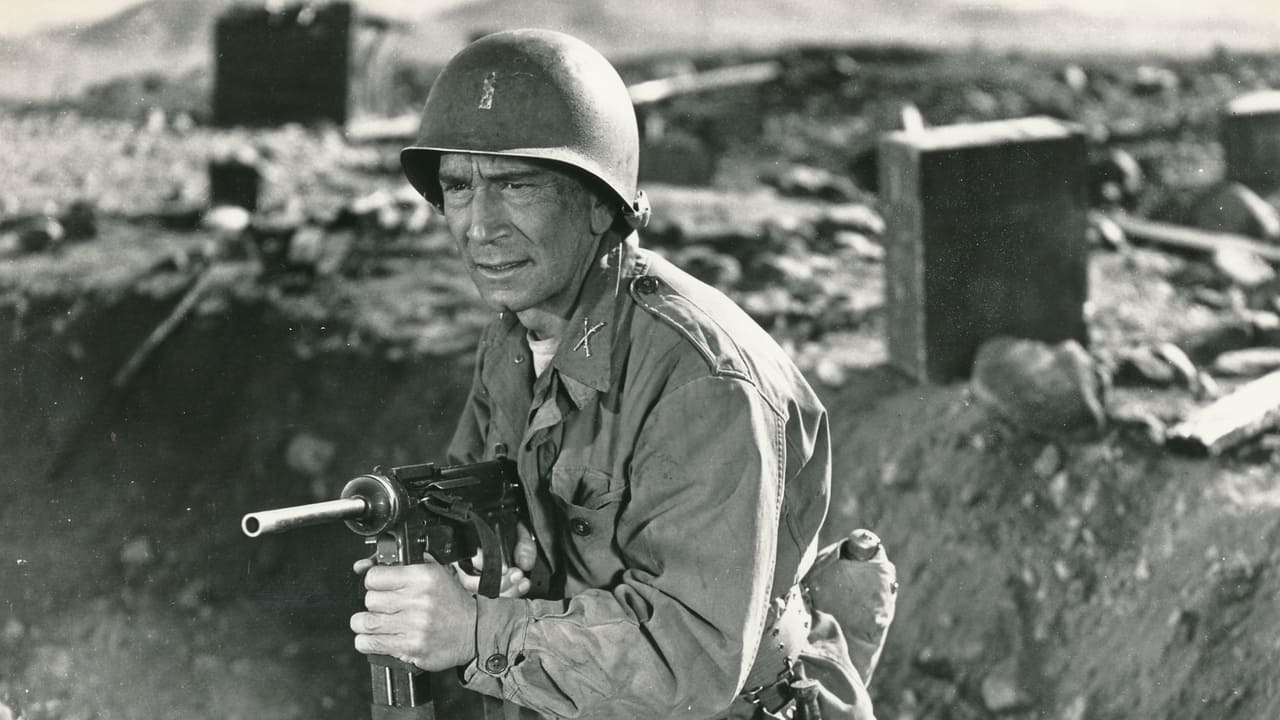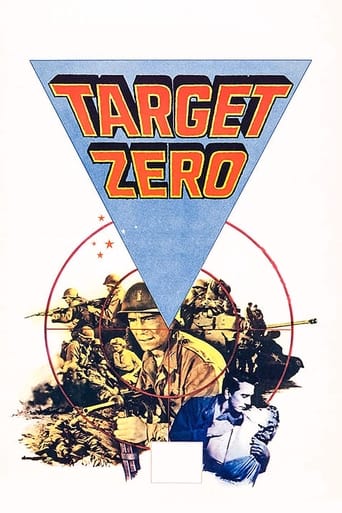

Target Zero is your typical war film, this one set in Korea and it gave some due to one other nation present on the peninsula. Richard Conte leading an American squad finds themselves a 3 man British tank crew headed by Richard Stapley. That tank prove to be essential though there is one rather unreal scene where the tank should have been blown up.Shapley doesn't like Americans he saw his sister ravaged by one during the last war. You know that British saying about the Yanks, "overpaid, oversexed, and over here". Words he lives by.And there is a woman in the mix. Peggie Castle and Angela Loo UN health workers also stuck behind the lines. Loo is killed and Castle gets both Conte and Shapley's mojo going.They're trying to reach the rest of Conte's company. What happens when they do is one nasty climatic battle.One scene I thought rather stupid. The group uses the protection of the tank to clear a path through a mine field. I have to think in real life the tank would have been crippled and useless trying it. Could not buy that at all.The film is rich in character players though. Charles Bronson is Conte's sergeant and he's got such people as L.Q. Jones, Strother Martin and Chuck Connors among the troops.An average war film, nothing special.
... View MoreIt's Korea and the Chinese have just overrun the Allied lines. A disparate group of men (and one babe) find themselves flung together, struggling across plains and knolls, hoping to reach the safety of Easy Company on a hill top called "the muscle." Richard Conte is the ranking officer, a lieutenant, who organizes the few Brits with their tank, and gathers up an errant mortar couple, and woos the babe (Peggie Castle) who, through thick and thin, never gets her hair mussed or loses her false eyelashes.Conte and Castle fall in love after twelve hours together, which runs about normal for these routine flicks. This is highly resented by the British sergeant who commands the tank. Why? Well, during the war, England was overflowing with Americans who were resented by some of the English gentlemen because they were "overpaid, oversexed, and over here." (Kids, that's World War II, the one that came after World War I.) The sergeant is particularly annoyed because, well, one of the Yanks began dating his sister and, well, "it didn't end pleasantly." However, have no fear. By the end, when they finally reach "the muscle" and find all of Easy Company dead and then they have to fight off innumerable bandy legged, inscrutable Chinese troops -- do they make friends with one another? Does Conte smile and pat the sergeant on the back, and does the sergeant smile back? You're kidding.Conte is an interesting actor. He has two expressions: one is a smirk and the other isn't. Not to laugh. It carried Gary Cooper through several generations of movie-goers. As for his apparent power over the good-looking, hypermastic Peggie Castle, well, so what? A few men have that ability to win attractive women over with a glance. I know I do. Just the other day in the supermarket, a blond who could have doubled for Scarlett Johhanson, threw herself at my feet and begged to be my slave. I sent her packing. These importunings get tiresome after a while.But back to the movie. It contains of one of those -- "FREEZE! We're in the middle of a mine field" scenes. Very tense.The whole affair comes across as one of those television programs that were being made wholesale during the period. No soldier ever really gets dirty or dusty. Lots of action. The lighting is flat, as it would be on, say, "I Love Lucy." Why go on? You want to watch a movie that's almost as ritualized and predictable as a church service, this is it? If you want a genuine attempt at vernacular poetry, try "A Walk in The Sun." If you want realism, pre special fx, try "The Story of G.I. Joe."
... View MoreKorea, 1952, a UN patrol and a woman are trapped behind red Chinese lines.Unfortunately, this war film comes close to being truly dreary with about every cliché in the book. Had director Jones registered some troubled emotion from a generally talented cast, it would have helped. Instead, Conte and company act as if being trapped in combat is little more than a walk in the park. And what could be more absurd than those wooden romantic scenes in the middle of life and death.Then too, the script registers some genuinely leaden dialog, along with limp action staging that has all the combat intensity of a round of hide and seek. Good thing for our side that the Chinese bunch up across open terrain so that a couple of bullets can mow 'em all down.I get no satisfaction from belaboring these results since I recall when the movie was shot south of Colorado Springs and we high school boys were thrilled at seeing a movie star like the lovely Castle. (Look quickly and you can see Cheyenne Mountain where air tracking defenses for North America are now located underground.)Still, the movie does have one stunning sequence where a squadron of Lockheed jets swoops really low over uneven terrain to drop their napalm. It's a breath-taking air show. Nonetheless, I expect the movie's most memorable feature are the up-and-comers in the supporting cast—Bronson, Connors, and future TV mogul Aaron Spelling. All in all, however, it's an unfortunately forgettable 90-minutes of people managing to go through the motions.
... View MoreIf you're looking for a hard-hitting Korean War film made in the 1950s, something that illuminates the anguish, tension and hard command decisions made in the heat of battle, you'll do well to seek out Sam Fuller's THE STEEL HELMET (1951), Anthony Mann's MEN IN WAR (1957), and Lewis Milestone's PORK CHOP HILL (1959). Even Tay Garnett's ONE MINUTE TO ZERO (1952), starring Robert Mitchum, has its penetrating moments. If, on the other hand, you're looking for laughable dialogue and hoary clichés, then you're best left with Harmon Jones' TARGET ZERO (1955), about allied soldiers—and a woman—lost behind enemy lines and wandering rather aimlessly over a sunny American landscape doubling for Korea.You can tell where the film is going right after the opening credits as a truck carrying two women, an attractive American blonde and an Asian woman in fatigues, is hit by North Korean mortar shells and goes crashing into a ravine. The blonde gets out, a little shaken and dazed but thoroughly unscathed, with hair and makeup intact, while the poor Asian woman is dead, having had about one line of dialogue and mere minutes after the actress's name (Angela Loo) appeared in the credits. The hot blonde is Annie Galloway, a "biochemist" with the United Nations health team, and she's played by Peggie Castle, a regular in westerns and Mickey Spillane adaptations of the era. She quickly hooks up with a straggling English tank crew led by a sergeant named David (Richard Stapley), all of whom are then joined by a lost American platoon seeking Easy Company. The Americans commandeer the tank to aid their search and recruit Annie to act as nurse to a wounded man (Strother Martin) whom they place on the back of the tank. After a few miles of this she complains that the bouncing of the tank in motion is hurting the wounded man, so they take him off and make one of the soldiers carry him on his back, as if that wouldn't hurt him even more! Even if that soldier happens to be Charles Bronson!The ranking American officer, Lt. Tom Flagler (Richard Conte), soon starts putting the moves on Annie, making the uptight English sergeant very jealous indeed. Annie, in an unlikely turn of events, eventually responds to Flagler's rather crude charms. At one point, they're in a bunker and exchange this dialogue after a rather foreseeable tragic occurrence: Annie: "What's the matter with me, Tom? Why can't I cry?" Tom: "You've been at war, Annie. In here, death is like rain. Some days you have it. Some days you don't." Annie: "It's all so distorted. Nothing seems real or lasting." Tom: "We're real, Annie. You and me." That's what the script is like.Unlike the Korean War movies cited in my first paragraph, no one here ever seems to take their situation seriously enough. There's a wisecracking southerner named Felix (L.Q. Jones) who jokes at every turn. There's an American Indian named Geronimo (Abel Fernandez) who tells Felix that the Indians joined the army so they can learn the white man's fighting skills and take America back from them. Later, Flagler approaches Geronimo as he's preparing to face down attacking "Reds" and asks him, "Whaddaya say, Injun?" Geronimo responds with "Now I know how Custer felt." It's that kind of film.L.Q. Jones and Strother Martin both play members of the platoon and would later famously team up as the pair of scuzzy bounty hunters, T.C. and Coffer, in Sam Peckinpah's THE WILD BUNCH. Chuck Connors (TV's "The Rifleman") turns up as radioman Moose. Aaron Spelling, the future TV mastermind behind "Charlie's Angels," "Fantasy Island," and "Love Boat," shows up as "Strangler," one of those annoying, obsequious little sidekicks you often saw in war movies (and Warner Bros. cartoons). Charles Bronson is his usual earnest self. Richard Conte walks through his part with a casualness that's a pale echo of the studied unflappability he brought to his roles as infantry grunts in World War II movies such as GUADALCANAL DIARY and A WALK IN THE SUN ("Everybody dies"). The film was shot on the grounds of Fort Carson, a U.S. Army base in Colorado, and made use of the Colorado Air National Guard in the film's one impressive combat sequence, in which we see a team of four fighter jets attack the oncoming Reds as our heroes defend a hill called "Sullivan's Muscle." The jets do some stunning maneuvers and are seen in shots with the actors, including one startling bit where a jet appears from below and flies right over Conte's head. That must've required some heavy-duty persuasion. In another comment here, the writer mentions "freezing winter conditions" and "the plight of civilians." The terrain presented here seems quite sunny and warm and if there were any scenes with civilians, they were completely absent from the print of this film that I saw.
... View More